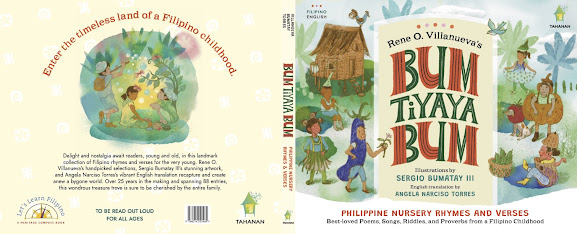Angela Narciso Torres presents “A Note from the Translator” to
(Tahanan Books, 2023)
Growing up in Manila on such childhood staples such as “Bahay Kubo” and “Leron Leron, Sinta,” I never imagined I would one day translate them for 21st century readers. I can’t recall when I first encountered many of these. Perhaps they were hummed by my grandmother while cooking Sunday lunch, sung by friends on the schoolyard, or whistled by a neighbor sweeping his front steps. They were in the air we breathed.
Being raised bilingual, I also learned Mother Goose nursery rhymes from an early age. “London Bridge” and “Ring Around the Rosie” were as much a part of our childhood games as “Penpen de Sarapen.” It is from these dual roots that I approached the translations of these artifacts of Filipino folk literature for modern readers.
Filipino is a musical language. Repetitive open vowels and staccato syllables make for catchy, rollicking rhymes. My foremost aim was to capture this playful music for English readers. To this end, I aspired to mimic the easy cadences of everyday speech, language one might overhear on the playground, at the market, or along a country road.
In Filipino, rhyming words are readily available. Most words end in the vowel sounds a, o, or i. Also, almost any word can be reconfigured to fit a given rhyme scheme or syllabic count. In the first verse of the traditional farming song “Magtanim Ay Di Biro” (Planting Rice Is No Joke), each line ends with the vowel sound o.
Magtanim ay di biro
Maghapon nakayuko
Di naman makatayo
Di naman makaupo
The English language is not as malleable. Hence, in my translation of this song, as in many other translations in this book, I turn to slant rhyme, internal rhyme, or other sound devices in lieu of perfect rhyme. Here, I use consonance, repeating the k sound at the end of each line. I also substitute the original A-A-A-A assonance with an A-A-B-B pattern.
Planting rice is not a joke.
All day long you’re in a yoke.
Never sit, never slack.
Never ever stretch your back.
In translating these texts, I made every effort to honor the original intent and to use images from Philippine life and culture. Yet sometimes, in my search for a more compelling or amusing translation, I found it necessary to prioritize play over literal meaning. Hence, literal translations have been provided at the back of the book. This should allow curious readers to trace the journey of these translations from their origin.
It is my hope that readers of all ages will sing, play along, and be amused by these translations as much as I enjoyed their much-loved Filipino versions as a child. If not, the fault is entirely mine.
ANGELA NARCISO TORRES
*****
Angela Narciso Torres is the author of What Happens Is Neither (Four Way Books in 2021), Blood Orange, winner of the Willow Book Literature Award for Poetry, and a chapbook, To the Bone (Sundress Publications, 2020). Recent work appears in POETRY, The Missouri Review, and TriQuarterly. A graduate of the Warren Wilson MFA Program and Harvard Graduate School of Education, Ms. Torres has received fellowships from Bread Loaf Writers’ Conference and Ragdale Foundation. She serves as a senior and reviews editor for RHINO Poetry.


No comments:
Post a Comment